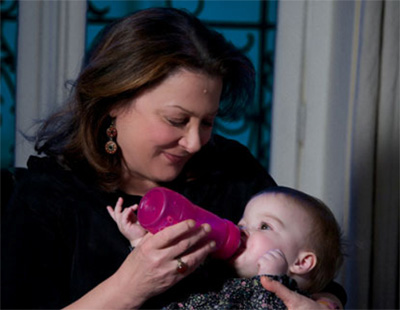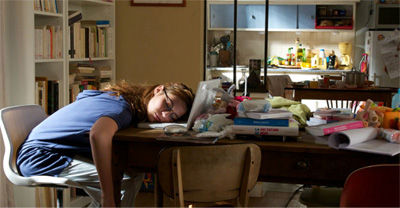Josiane Balasko A Happy Event Interview

Josiane Balasko A Happy Event Interview
Cast: Louise Bourgoin, Pio Marmaï, Josiane BalaskoDirector: Rémi Bezançon
Genre: Romance, Drama
Rated: MA15+
Running Time: 107 minutes
Synopsis: Barbara - intelligent, ambitious and gorgeous - is a post-graduate student, while Nicolas, replete with boyish charm, is a clerk in a video store. After a humorous courtship in the video store where Nicolas works, the pair begins a passionate romance that grows into relationship bliss. They frolic, they dine, they paint walls together and all too quickly they find themselves enthusiastically, if not slightly nervously, embarking on their biggest joint venture yet - their first child.
But what begins as a life step they decide to embrace with joyful abandon, quickly starts to change shape (both figuratively and literally) as Barbara's tummy swells with their unborn child and new pressures start to weigh on their relationship. Hormones begin to race, emotions run high and identities begin to fracture. The reality and pit-falls of child-bearing and rearing soon hits home, and despite the support of those around her, Barbara struggles to connect with her baby.
Release Date: April 12th, 2012
Interview with Josiane Balasko
Rémi Bezançon Josiane, do you remember how we first met?Josiane Balasko: Yes, it was in Athens, at a festival where we were both showing a film. Yours was "The First Day of the Rest of Your Life", and mine "A French Gigolo". Except that I had never seen your film, or you mine. So we talked about other things and drank ouzo!
Rémi Bezançon Hmm... Yes. But the next day, despite my headache, I did go to see your film...
Josiane Balasko: And I saw yours. We talked about our respective films, and then we met again at another festival, the Colcoa in Los Angeles, where we continued talking quite a lot. And that's how things were until you sent me your new screenplay.
Rémi Bezançon I was afraid you would turn it down because the role wasn't important enough.
Josiane Balasko: It is in fact harder to work on a film occasionally, being on set one day here, one day there. Having to get back into character every time is harder than when you're on set day after day, and you can build up your character over the long run. But I wanted to work with you. I found your screenplay very interesting. You treat all the themes that have to do with maternity in a very honest way. No one in general talks about that. Maternity is looked upon as a pleasure, as a great adventure: the big adventure in the life of a woman. Or otherwise it's treated very dramatically, if the child is unwanted, for example. But here you show a normal couple who wants this baby. And so what does really happen once a woman is pregnant, once she delivers the baby, once the baby is there and the couple has to change and become a family?
Women talk among themselves, of course, about the little problems and worries they may have with their partner during the pregnancy, or once the child is born, but that is hardly ever seen in the movies. So I was interested to see how you would tell this story, and especially in a comic way, tenderly but without pathos, with a light touch, but still very true to life.
A Rock'n Roll Family
Rémi Bezançon Were you able to recognise yourself in your character Claire? We talked about it quite a lot before shooting, but I never did ask you what attracted you to her?
Josiane Balasko: I like her frankness. There's has a hard-nosed, rough and ready side to her. She's a mother who raised two daughters alone, which is no small thing. She's very protective, which makes her say some awkward things in front of Barbara. Their relations are rather conflicted, but that's just a logical development of the totally symbiotic relations she had with her daughters and that you let us see toward the end of the film. I think she is a good depiction of the difficulties the parents of a mono-parental family can have. But before being a mother, Claire is a woman, and a rather rock'n roll one at that. That's the side, the "rock'n roll family" side that I liked. She was part of the counter culture, she lived through May 68, with all the aspirations and ideals of that period, she travelled to Nepal, she must have had some experiences with drugs, with joints, etc. Even her relations with her husband are a bit rock'n roll, because at a certain moment she tosses an iron at him!
Rémi Bezançon Yes, but frankly, giving her an iron for Christmas was looking for trouble. After all, she's a woman who must have been thoroughly into Women's Lib!
Josiane Balasko: For sure! Besides, it isn't that easy to fling an iron the right way, without hurting anyone.
Rémi Bezançon Yes, there were no deaths that day, just a lot of takes.
Josiane Balasko: Which is to say that the iron had to be thrown properly, and that's easier said than done, because it's a heavy, oblong object, and you have to take into account the dynamics of its trajectory... a word of advice to iron throwers: it's all in the aim! It's a lot more complicated than burning your bra.
The New Women's Lib: Equilbrium
 Rémi Bezançon Do you believe that Claire burned her bra in 68, or is that just another urban legend?
Rémi Bezançon Do you believe that Claire burned her bra in 68, or is that just another urban legend?Josiane Balasko: I think most bras were burned as part of the American Women's Lib movements. But it is possible that there were some burned in France as well. In any case, if Claire didn't do it, she probably thought about it pretty much. She was in complete agreement with women who burned their bras! She probably wouldn't do it today. Like all those old hippies, she finally settled down. But she must still see herself in movements that work for women's liberation today, as Élisabeth Badinter works, for example, in such a very intelligent way. Because you can't say that women's lib is over, no, it's far from over. Sexism, violence, inequality... there are still a lot of fights to wage.
Rémi Bezançon Feminism has also nudged issues forward that concern maternity too. Before, women had to say that the most beautiful day in their life was the day they brought a child into the world. Since then, they have become able to admit that delivery was a bit difficult, even with an epidural. Back in the 70s, women fought for their independence, for the right to have a career, to have a baby or not to have a baby. They were finally free from having to be the perfect mother at home that the previous generation had to be. For women today, the legacy is rich but contradictory: they have to strike a balance between maternal devotion and complex-free lucidity. They want to work, but they also want to be free to breast feed if they feel like it. They want to conquer the work market, but they also want a successful life as a couple and family. In fact, they want to find their own equilibrium, and I think that is a noble ambition.
Josiane Balasko: Your film is a little feminist then?
Rémi Bezançon Yes, maybe�
Interview by Brooke Hunter
MORE
- Mission: Impossible Fallout
- Glenn Close The Wife
- Allison Chhorn Stanley's Mouth Interview
- Benicio Del Toro Sicario: Day of the Soldado
- Dame Judi Dench Tea With The Dames
- Sandra Bullock Ocean's 8
- Chris Pratt Jurassic World: Fallen Kingdom
- Claudia Sangiorgi Dalimore and Michelle Grace...
- Rachel McAdams Disobedience Interview
- Sebastián Lelio and Alessandro Nivola...
- Perri Cummings Trench Interview



